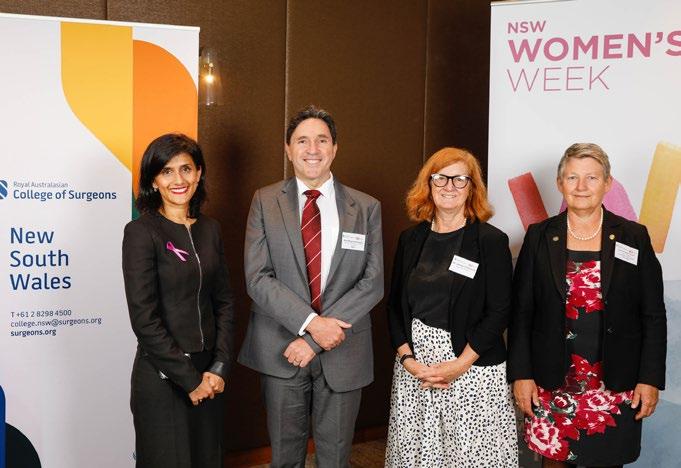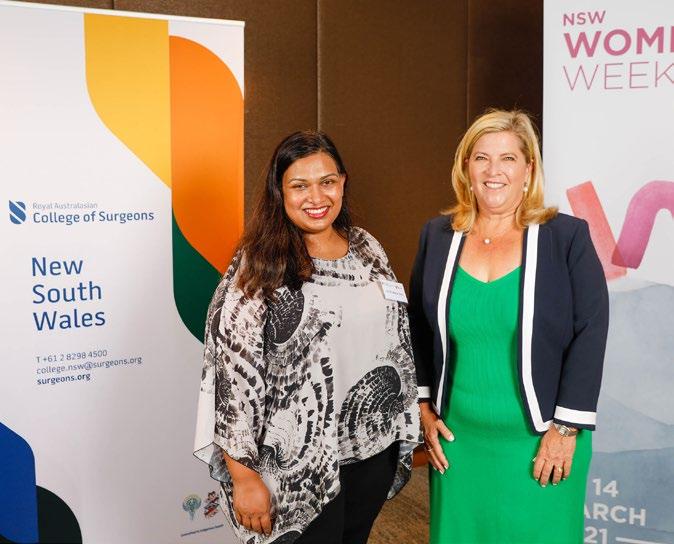
4 minute read
International Women’s Day at RACS
International Women's Day was commemorated on Monday 8 March, with various RACS events hosted around the country.
As part of our International Women's Day program, the ‘President’s Meeting Room’ at the College will now be called the ‘Anne Kolbe Room’ in honour of our first female President, who was President of RACS 2003-2005.
Advertisement
In South Australia, Fellows and Trainees gathered at the new RACS office in Kent Town, Adelaide to celebrate the day. The ceremony was attended by the RACS Women in Surgery Chair, Dr Christine Lai, who took part in a panel interview with ABC journalist Wendy Harmer the day before, and former Queensland Premier Anna Bligh. Listen to their conversation here.
In Queensland, the local membership met at Customs House in Brisbane for a lunchtime gathering on Saturday 13 March.
A similar function was held in Western Australia, where guests gathered at Goodwood Restaurant at Optus Stadium on Saturday 20 March.
New South Wales International Women’s Day
On Friday 12 March I was honoured to chair a discussion on ‘Gender Parity in the Public Hospital Medical Workforce’. This event was co-hosted by the Royal Australasian College of Surgeons (RACS) New South Wales and the Honourable Bronwyn Taylor, New South Wales Minister for Mental Health, Regional Health and Women.
The purpose of the day was to focus on gender barriers in surgery, especially in the public hospital system. This was scheduled as part of New South Wales Women’s Week, a week dedicated to celebrating achievements of women in the state.
During my time as a RACS New South Wales Committee member and now as Chair of the Committee, I have heard many female Fellows who have engaged with RACS New South Wales report frustration with current workplace practices. This was reflected in the discussions throughout the day, with many barriers to women’s success identified.
These included:
• Difficulties accessing parental leave (both maternity and paternity)
• Female Fellows being discouraged from applying for advertised public positions and being told that the preferred candidate is a male
• Female Fellows working unpaid in nonclinical roles or being appointed but without operating privileges.
These issues compound the problems of the lack of visibility of women in surgery, which leads to barriers to attracting women Surgical Education and Training (SET) applicants, as well as a significant gender pay gap, which can be greater than 50 per cent in some specialties (based on RACS 2014 census data).
RACS has a diversity and inclusion policy and has been very proactive in increasing representation of women to boards and committees. Currently, 35 per cent of RACS committee and board members are women, even though only 14 per cent of Fellows are female. Despite this, the proportion of female SET applicants has not increased beyond 30 per cent.
Many who attended the March 12 event felt a major contributor to this disparity is the lack of diversity in surgical departments in public hospitals. As more female Fellows complete training, if these gender barriers are not addressed, the problems will apply to a larger proportion of the workforce.
There is significant research that shows that diverse healthcare teams have better patient health outcomes, are more adoptive of innovation and change, and demonstrate better financial outcomes. RACS New South Wales believes that all Trainees completing the training program have demonstrated adequate capability to be registered as a practitioner in a relevant specialty. Furthermore, data reveals that outcomes achieved by female surgeons are not inferior; rather, these surgeons may be equal or superior to their male peers.
The theme of this year’s International Women’s Day, #choosetochallenge, was so appropriate. We should all choose to challenge the barriers and discriminatory behaviour in surgical departments, and question why they are so prevalent and systemic. Unless these barriers are changed, not only will there not be parity in the workforce, there will also be a continued absence of female surgical leaders in our health system. Panellists for the discussion included: Minister Bronwyn Taylor; New South Wales Secretary of Health, Ms Elizabeth Koff; CEO of Sydney Local Health District, Dr Teresa Anderson AM; Head of Discipline of Surgery, University of Sydney and cochair of the Institute of Academic Surgery at the Royal Prince Alfred Hospital, Professor Paul Bannon; RACS Councillor and Australian Society of Otolaryngology Head and Neck Surgery (ASOHNS) Vice President, Professor Raymond Sacks.
Thank you to everyone who attended this event, including RACS committee members, Councillors, society and section representatives (especially those who travelled interstate), representatives from other colleges and the Australian Medical Association, as well as government representatives. I would particularly like to acknowledge those at the New South Wales Ministry of Health, who have championed this issue and expressed an ongoing commitment to address the barriers female surgeons face.
It was great to see the widespread support from all genders across several institutions, and the open forum, which allowed these vital discussions to take place. While we still have a long way to go, it is events like these that play a key role in setting the standards we should all abide by and uniting us in using these standards to deliver the best patient outcomes in health.

Associate Professor Payal Mukherjee with RACS Councillors Professor Raymond Sacks, Dr Jennifer Chambers OAM and Miss Annette Holian.
Dr Pecky De Silva, Deputy Chair of RACS Women in Surgery and Chair of Younger Fellows committees, with the Hon. Bronwyn Taylor.

Associate Professor Payal Mukherjee FRACS






